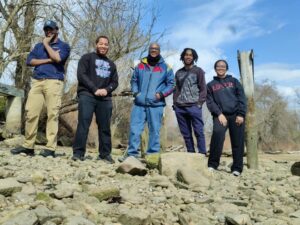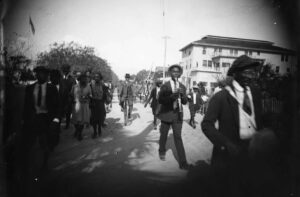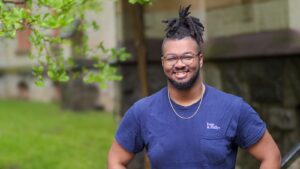I recently spoke with Tarah Paul, C’24 about a range of topics such as Black History Month, Penn Athletics, and Makuu: The Black Cultural Center. During our conversation, I often found myself awestruck due to the strength of her words and the thoughtfulness of her ideas. When I asked her about what Black History Month meant to her, she said:
For me, it means celebrating and cultivating. It represents showing appreciation, grace and gratitude because Black History Month is not just one month, it's every month. It's also because living as a black person is history in and of itself…
Tarah Paul
Her statement is powerful. As a community, we must recognize, celebrate, cultivate, appreciate and show gratitude towards Black culture and the people putting in the work for equality and inclusion. As Tarah said, this should happen not just during Black History Month, but always.
Tarah’s work in support of her community is remarkable. She is co-chair of Umoja, works as Makuu’s Student Coordinator, is a member of The Inspiration A Capella group, and is involved in countless other organizations on campus and within the Philadelphia community. Tarah expressed she loves being involved and doing this type of work because she wants to give others the best possible experience. She wants to be the biggest advocate for others in the same way Makuu has been for her. This is one of the most important sentiments I took from our conversation – the idea of being a supporter for others and what it means to have advocates on your behalf.
Everyone deserves to have someone you can lean on and a chosen family. I’ve heard from many people, including alumni, graduate students, or people outside of Penn, about how their biggest regret was not finding a place in college where they felt supported or where they felt at home.
Cultural Resource Centers at Penn, such as Makuu and La Casa Latina, give people the space to feel at home and feel part of not just a community of people, but a family too. Penn benefits from this family-like culture and from having people like Tarah who think creatively or seek to make solutions to better the experience of everyone.
For example, Tarah identified a need within her community for free beginner swimming lessons and sought a solution, ultimately bettering the experience for everyone around her. Now, because of Tarah’s initiative, as well as University Life and campus partner support, 40 students have the opportunity to learn how to swim. This is something that, due to lack of accessibility in society, they wouldn’t have been able to do otherwise.
My goal for people reading this story is knowing the importance of paying attention always, not just at a particular time, to those who make the Penn experience more meaningful for others. We should not only celebrate people but also learn from them and strive to do our part in making the community better. We should do as much as we can to make people feel at home and to feel like they have family, especially in a world that seems so divided. This is the real Penn experience. These everyday moments in which we all come together, as little as they seem, is the real history and one in which I am proud to be a part of.
Highlights from my Conversation with Tarah
Tell me about yourself.
I’m a graphic design major at Penn. I’m currently a junior and originally from Philly. On the side, I love photography, videography, graphic design and small passion projects. I also love baking, especially banana bread. It’s become my staple dish.
Tell me more about your involvement with the Inspiration A Capella group. What is your favorite song to perform? Can you sing a snippet for us?
The group is primarily focused on music written or performed by artists from the African Diaspora. Our purpose is to entertain and educate. I joined the group in my freshman year, which was during Covid-19. It was a crazy transition going from online to in-person performance and it helped me appreciate the group, which built my community even more. My favorite songs that we have performed are “Bass Song” by PJ Morton and “Sure Thing” by Miguel.
I’ve linked both performances below!
Penn Campus Recreation Collaboration
I’ve heard you are working with Penn Campus Recreation. Tell me about the project you are working on?
The project is a collaboration between Penn Campus Recreation alongside Makuu. We are working with Shana Vaid, Aquatics Coordinator, and we’ve also been working with Erica Hildenbrand, the Director of Campus Outreach, with the aim to create a swimming lesson program for Black students at Penn. The idea started because I noticed that there was a need for free or subsidized swimming lessons for Black students. I don’t know how to swim, and I know there are other students like me who also don’t know how to swim. I talked to Brian, the Director of Makuu, about how we could offer something that gives students the opportunity to gain water skills. We then talked to Shana and Erica about this idea. Ultimately, we were able to have our first cohort of 40 students who signed up and who are receiving 8 free swimming lessons this Spring.
What inspired you to come up with this project and how did you bring it to life with Penn Campus Recreation? What was that process like?
In terms of process, we had meetings to determine the logistics of the swimming lessons and we also had meetings with different stakeholders like University Life, Penn First Plus, Office of Social Equity and Inclusion, etc. to get their involvement or support to offset costs. Additionally, our first cohort received swimming gear because we wanted to alleviate any other financial burden. That was the process behind the scenes, and we were able to start the program in January.
Do you have any specific information that you would like to share about the pilot program?
We are hoping to have another cohort after Spring break. The first cohort won’t be the last cohort, so we will have more to offer and more sign-up opportunities like this for Black students at Penn in the future.
What is your favorite style of swimming if you have one?
I don’t have one since I’m still a beginner in swimming; however, I learned how to do a handstand and a flip, and I think that is fun. I like doing silly things in the water because before these lessons I couldn’t do that
Makuu and Black History Month
What does Black History Month mean to you?
To me it means celebrating and cultivating. It also means giving appreciation, grace, and showing gratitude. Black History Month is not just one month, it’s every month. It’s also because living as a black person is history in and of itself. This is a moment to do reflection and gain the attention we already deserve – prominent past or current figures did and are doing amazing work to serve our communities and society. When I say celebrating black history, I mean celebrating the work the people are doing and the work that people have done. When I said cultivating, I mean not just in doing work in the past tense but continuing to do the work and continuing to push for equality and inclusion in all spaces. When I say showing gratitude it’s also thanking people and acknowledging the time and effort that people have and are putting in daily – to not be selfish but selfless. That is what comes to mind.
What is Makuu and what is their goal?
Makuu is a Black Cultural Center on Penn’s Campus. It serves as a resource center or a cultural resource center for its students and the Penn community. I know Makuu as my second home and I’ve been able to develop close relationships with the people who interact with Makuu through Brian Pearson, Director of Makuu, Michelle Houston, Associate Director of Makuu, and many others. In Makuu they are your supporters and your advocates. They are able to be a resource to you. Thus, whether it’s through classes, hosting events, networking, or through Robeson Cooper Scholar program, which I am also a part of, they can support and to create a second home for its students.
You have a leadership position at Umoja. What is your role within the organization? What work does the organization do for the community?
I am a co-chair of Umoja which is a 7B organization as well as an umbrella organization that oversees 28 black constituent groups including BSL, MAPS, NSBY, and The Inspiration – to name a few. As co-chair we help lead GBM’s, meet with other 7B organizations, and we also work with Makuu and University Life. We also help provide funding to our constituent groups. Some of our recent events have been in collaboration with Makuu to lead open forums during BHM. We are planning on celebrating UMOJA 25th anniversary and making a UMOJA week this fall with a culminating event to celebrate all the work that has been put into this organization.
What events did Makuu organize for Black History Month?
Makuu helped hold a plantain party and we also invited a Black Penn alum to speak. The speaker was Kalyne Coleman, an amazing actress who is doing great work in her field.
Makuu also worked with the Penn Fund and Alumni Relations to invite other Black Penn alumni to come speak in a panel about what it’s like after graduating and the importance of giving back to Penn.
Other events include Step Afrika, which was a performance in Irvine that had a really great turnout.
Can you tell me a bit about your vision for the BHM mural?
I worked with Makuu and with University Life to make the mural come to life. The theme behind the mural was to center it around a piece created by Black Penn alumni Abdi Farah called “Cloud of Witnesses”. This is a charcoal drawing of notable Black Penn alumni including John Legend, Julian Able, Sadie Mosell Alexander, among many others. In addition to centering the mural around that specific piece, we wanted it to include images of black joy, black experiences, and black moments to show the full spectrum of what you see as black history. Within that concept, I worked with the art direction for the mural alongside University Life, Umoja constituents, and Monolith – a black student visual arts collective. In collaboration with two Monolith artists, we were able to come up with drafts for the mural until we settled on what you see now.
What has been your favorite Makuu moments?
My favorite Makuu moments are either in the “living room,” which is located at the ground floor of the ARCH, or the many events I share with my friends. It could even be as simple as meeting someone and having a conversation with them. Those spontaneous moments are the ones I like the most. Some specific events that come to mind are Kwanzaa, the Senior Celebration, and Makuu family dinner.
What do you feel you have learned about yourself from your experience in Makuu?
I think what I’ve learned is how much I want to give back. This is because I have seen the difference it makes to have someone in your corner. I want to help others in the same way that Makuu helps me. This is one of the lessons that I have learned from Makuu. That’s why it’s so important to me to find ways to be creative and to use the tools that I have in order to make an experience better for others. That’s also why I love being co-chair in Umoja and why I’m so involved in many other organizations on campus.
On Being a Leader
What does it mean to be a leader at Penn in the Black community, and could you tell us what you’ve learned?
I almost don’t want to think of myself as a leader because to me it evokes a sense that there is a difference between me and my peers. If anything, I want to think of myself as their biggest supporter, advocate, and cheerleader. I would much rather use those words than describe myself as a leader because these are people that I consider my friends and are also going through the same issues day-to-day. In my role, I want to make sure that their needs are being met, that they feel like their voices are being heard, and that they feel like someone is in the room advocating on their behalf to make the environment or the community better for them.
I’ve also learned patience. While I always thought of myself as a patient person, I have become even more aware that you can’t solve everything in a day. As someone who thinks creatively all the time, I know not everyone works within the same schedule or pace as you do. Thus, you must be patient and consider the long run instead of trying to do a quick dash towards an outcome. I’ve learned to be okay with the baby steps, with listening, and with becoming more understanding. You must be understanding because people have different experiences and opinions as you do, and even within the same community it’s not binary. There’s a whole range of experiences. I think, overall, it’s about being able to give grace to myself and to others.





